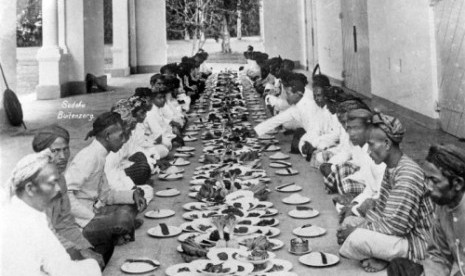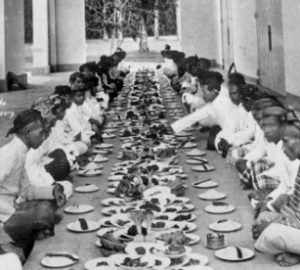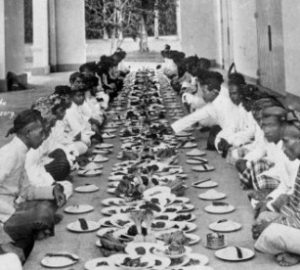In the past, Tegalrejo was a village inhabited by two groups of communities. Santri who were identical with piousness and obedience to religion stayed in north side of the village, while those who were lay in religion (abangan) stayed in the south. Abangan people were traditional art enthusiasts such as Jathilan, Tayub and so on.
At one time, because the allocation of funds from government in central office were not enough to fulfill all development cost, the village head of Tegalrejo gathered his residents in the pavilion of the Village Hall for meetings.
After opening of the event with short remarks, he immediately conveyed the purpose of the meeting. He started his speech saying, “Ladies and Gentlemen I respect. At present, we get development assistance funds from the central government. However, these funds do not make it possible to cover all existing development needs. Therefore, I hope that you convey and agree on which development should be put at first and prioritized. ”
Someone who sat somewhat in the middle rose his hand. After given chance, he stood up and said, “Look, chief. Our village is planning to build a mosque. The construction of this mosque certainly requires substantial funds. Therefore, I suggested, the funds were allocated only for the construction of the mosque. Other proposals that have not been accommodated, we budget for next year. ”
Not until the first proposer sat down again, a meeting participant who was sitting in the back corner stood up and submitted his opinion, “Sir, we are traditional art lovers trying to preserve the great of our culture. For this reason, we need support and financial assistance from the village government to purchase Gamelan instruments. ”
After a while, the discussion pursed the two proposals; building a mosque and purchasing Gamelan. “Ladies and gentlemen, thank you for the input submitted. However, I apologize, considering that the existing budget cannot be realized to cover both at the same time in this year’s budget. One of them must be pending for the next year’s budget, “explained the head of village.
There was then a long and difficult debate between the two parties. The agreement could not be reached. The meeting was in deadlocked. Seeing the tensions that began to peak, the head was worried.
He tried to mediate, “Ladies and gentlemen, if there is no agreement, what if we ask for the opinion of Kyai Chudlori?” If the name Kyai Chudlori has been mentioned, no one can refuse. All agree, especially the people of North side.
Then the Head of the Village together with several community leaders from the two parties went to Kyai Chudlori. After explaining the problem, the head said, “What do you think of it, Kyai?”
Kyai Chudlori did not immediately answer. He invited the guests to enjoy the available dishes and then said briefly, “Head of the Village and all of you, in my opinion for this year’s budget, the funds will only be bought for gamelan as proposed by our brothers and sisters drom the south.”
As agreed before, although there were some who were disappointed, no one refused the opinion of Kyai Chudlori.
All returned home with their own feelings. People from the south were certainly happy because they have received unexpected support at all. On the contrary, North people were disappointed. Kyai supported the abangan people.
For the sake of avoiding the sound of suspicious and negative thinking toward Kyai for his decision to support abangan, mosque construction committee and several residents who were upset decided to go to Kyai Chudlori again.
Seeing their arrival, Kyai Chudlori smiled. “I already knew what you meant by coming. You question my decision the other day right?” Said the kyai.
“How many years have you planned for the construction of your mosque?”, Asked the kyai.
Hearing the Kyai Chudlori’s question, the committee chairman replied, “Pardon me, Kyai. About four years, insyaallah, finished”
“That is way too long! I’m sure it’s not that long. In a period of approximately one year, God willing, the mosque will be finished,” said Kyai Chudlori with full confidence.
Excited mixed in question crammed into their hearts. Someone from them then ventured to ask, “How is it, Kyai?”
“I don’t need to explain now. In time, you will know,” said Kyai Chudlori enigmatically.
After feeling enough, the group asked permission to leave for home. Although there were questions in their hearts, they were no longer overwhelmed with disappointment and presumption. They are sure of the wisdom of their kyai.
Days, weeks and months change. The planned gamelan has already been bought. Faintly the sound of the gamelan accompanies Jathilan dance is often heard since then. Meanwhile, the construction of the mosque has not proceeded as planned.
Until one night, Kyai Chudlori invited all the residents to come to his house, both parties. On behalf of the committee, Kyai Chudlori conveyed the purpose of the meeting, “Ladies and gentlemen, the need for mosques as places of worship is very important and cannot be postponed. Therefore, I am representing the committee to invite you all to think about this. ”
The atmosphere became quiet for a while until a figure from south stood up and said, “Kyai, me and all the residents of south support the idea of building the mosque together. Isn’t that right, everyone?”
“Yes. We suppoert it fully,” said one of them.
After that night, all residents of two parties united to realize the big plan. That is to build the mosque together. With their own hands and money. It’s true what Kyai Chudlori said the other day. The mosque construction can be finished not more than a year.
Not only that, many people of south finally came to the mosque to pray five times a day. They seemed to ashamed of themselves. How could the mosque they built with their own money and hands be left empty?
________________________________________
Source: told by KH. Cholison Syafi’i, S.H. (PKPNU National Instructor in Central Java region) in PKPNU Activity Force II Dawe District in NU MA Raden Umar Said Colo (Muria) Dawe Kudus in 2018.
This article is available in Indonesian





